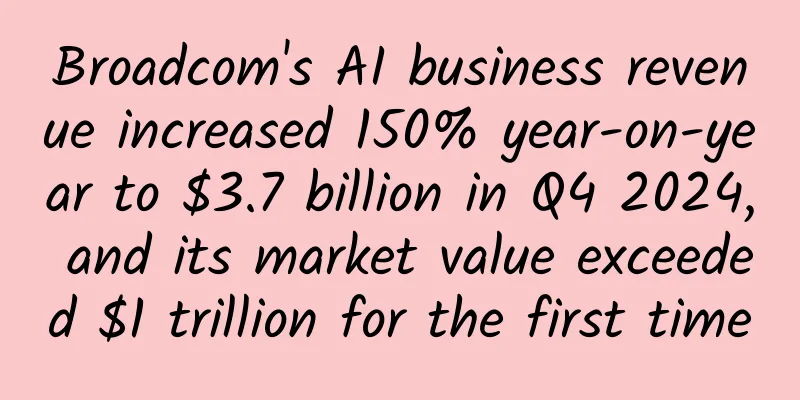Broadcom's AI business revenue increased 150% year-on-year to $3.7 billion in Q4 2024, and its market value exceeded $1 trillion for the first time

|
Recently, it was reported that in 2018, Broadcom tried to acquire its competitor Qualcomm for $120 billion, but failed. Qualcomm rejected the acquisition proposal, and the Trump administration also announced that the deal could pose a potential threat to national security. In March of the same year, Broadcom withdrew its acquisition offer and issued a statement saying: "Qualcomm is undoubtedly a very rare and excellent acquisition opportunity." However, it turns out that even without Qualcomm, Broadcom can move forward steadily. Last Friday, Broadcom's stock price hit a record high, with a single-day increase of 24%, and its market value exceeded $1 trillion for the first time. The chipmaker has thus become the eighth member of the "trillion-dollar club" in the technology industry. Since abandoning the acquisition of Qualcomm, Broadcom's stock price has risen by more than 760%, far exceeding Qualcomm's 165% increase in the same period and the 119% growth of the S&P 500 index. When Broadcom initially announced its plans to acquire Qualcomm, its official headquarters were in Singapore, which heightened the Trump administration’s concerns. Although Broadcom subsequently applied to re-register in the U.S., the Trump administration still blocked the deal. However, Broadcom CEO Hock Tan did not stop there and continued to seek large-scale acquisition opportunities. Since then, Broadcom has completed three major transactions worth more than $10 billion and gradually expanded its business areas far beyond its core semiconductor market. In July 2018, Broadcom spent $19 billion to acquire traditional software supplier CA Technologies; in August 2019, it acquired security software company Symantec for $10.7 billion. In 2022, Tan made his biggest bet to date, announcing the acquisition of VMware for $61 billion, officially entering the server virtualization market. The deal took 18 months to complete and became the third largest deal in technology history, second only to Microsoft's acquisition of Activision Blizzard for $68.7 billion and Dell's acquisition of EMC for $67 billion. "Broadcom started out as a pure semiconductor company, but over the past six years, we have moved into infrastructure software and that's going well, " Tan said in a September interview. He added that the recent acquisition of VMware was intended to create a more balanced business portfolio between chips and enterprise-focused infrastructure software. Last Thursday, Broadcom released its latest quarterly financial report, showing that although revenue was slightly lower than market expectations, profit performance exceeded expectations. In particular, its artificial intelligence business drove overall growth to a high level usually seen only in small companies. Broadcom's AI revenue grew 150% year-over-year to $3.7 billion in the fourth quarter ended Nov. 3, 2024. Some of that growth came from Ethernet networking components, which are used to efficiently connect thousands of AI chips. That performance helped drive overall revenue growth of 51% year-over-year to $14.05 billion. Meanwhile, Broadcom's infrastructure software division generated $5.82 billion in revenue in the fourth quarter, nearly tripling from $1.97 billion in the same period last year. This growth was largely due to the consolidation of VMware. Although Broadcom has not been able to fully catch up with Nvidia in the artificial intelligence boom, its growth is still strong. Nvidia's GPUs are widely used to train and run top artificial intelligence models. Its market value has surged 170% this year to $3.3 trillion, second only to Apple and Microsoft. In contrast, Broadcom's market value has doubled this year. Broadcom's growth momentum is also outstripping that of Advanced Micro Devices, whose stock price has fallen 14% this year and whose market value remains at $206 billion. Broadcom named its self-developed artificial intelligence accelerator XPU, which is different from the GPU sold by Nvidia. According to Broadcom, XPU shipments have doubled and are mainly supplied to "three large-scale customers." Although Broadcom did not disclose the specific names of its customers, analysts speculate that these three companies may be Meta, Alphabet and ByteDance. After Broadcom's earnings report was released last week, analysts at Cantor Financial Services pointed out: "Whether it is GPU or XPU, the future development prospects of artificial intelligence are very broad." Cantor recommends investors to buy Broadcom shares and raises the target share price from $225 to $250 in the next 12 months. Last Friday, Broadcom's stock closed at $224.80. Broadcom's origins can be traced back to 2015. The company was formed by the merger of Avago, which was spun off from Agilent Technologies in 2005, and Broadcom, which was founded in Southern California in 1991. Although Avago was the acquirer in the merger, the merged company still used the name "Broadcom". Hock Tan was appointed CEO of Avago in 2006 and became the helmsman of Broadcom after the merger. At the start of the merger, Broadcom had revenues of $13.2 billion in fiscal 2016, with the largest business segment being semiconductor products for set-top boxes and broadband access. By 2018, Broadcom's market value had climbed to $100 billion, with wired infrastructure still its main source of revenue. However, Broadcom did not stop there. At the end of 2019, the company adjusted its financial reporting focus to focus its business on two major areas: semiconductor solutions and infrastructure software. By 2020, semiconductor solutions accounted for approximately 73% of Broadcom's total revenue. Thanks to the addition of VMware, Broadcom's infrastructure software business has grown rapidly, with its revenue share increasing from 21% in the fourth quarter of last year to 41% this year. Even without considering VMware's contribution, the business has achieved a year-on-year growth of 90%. Looking ahead, Broadcom expects infrastructure software revenue to grow 41% year-over-year to $6.5 billion this quarter; semiconductor revenue is expected to grow 10% to $8.1 billion; and artificial intelligence business revenue is expected to grow 65% year-over-year to $3.8 billion. In September, Hock Tan said that as large technology companies continue to create and deploy large language models, their computing needs continue to grow, opening up huge market opportunities for Broadcom. He explained: " The computing needs of each generation of large language models are growing at a rate of 2 to 3 times or even higher every year. This means a larger and larger computing market, and these opportunities will mainly be captured by our XPU. " Alphabet, Amazon, Meta and Microsoft spent a combined $58.9 billion on capital expenditures in the most recent quarter, up 63% from a year earlier and accounting for about 18% of their combined revenue, according to tech research firm Futuriom. Harsh Kumar, an analyst at Piper Sandler, said Broadcom's unique competitive advantage is that it makes expensive custom AI chips for the world's top technology companies, which can run 20% to 30% faster while using 25% less power. “Only large companies like Google, Meta, Microsoft or Oracle can use these chips as they are not designed for common users,” Kumar added. |
>>: Domestic CPU Wars: Which is faster, Loongson or Feiteng?
Recommend
Does the APP record your voice?
1 There have been a lot of big promotions recentl...
How did the company, which was tied with Uber and got rid of Shenzhou Yidao, complete its counterattack in just 5 months?
If you are a frequent taxi user, you will definit...
The Boeing accident was unusual. Where was the fatal bug?
1. Starting from the EgyptAir crash Xiaobai: The ...
Taking GuangDianTong optimization as an example, what are the three factors that affect the delivery effect?
In this era of increasingly fierce competition, i...
Android must know-Use Intent to open third-party applications and verify availability
This article mainly records: Three ways to use In...
Red, yellow, pink...why have I never seen black flowers?
When we go to the flower market, we always see so...
Do you remember the "sour soup" incident? To prevent fumonisin poisoning, be sure not to eat this kind of food
What was originally a wonderful dinner for relati...
How to write a competitive product analysis, I have summarized 5 common problems and 1 set of methodology!
There is no doubt that competitive product analys...
iOS and open source: A red apricot blossoms
For most people, Apple and its iOS empire give pe...
Bring your own antidote and not be afraid of toxins: How did poison frogs and pufferfish become “poison masters”?
There are so many poisonous animals in nature. Ha...
Advertising overview in May, inventory of top advertisers for App and brand promotion
This article shares with you an overview of the t...
With the trend of social e-commerce, has KOL marketing become a new traffic entry point?
Why do Chinese companies choose KOLs as their fir...
Sleep vs. Health——To the Working People!
One third of a person's life is spent sleepin...









